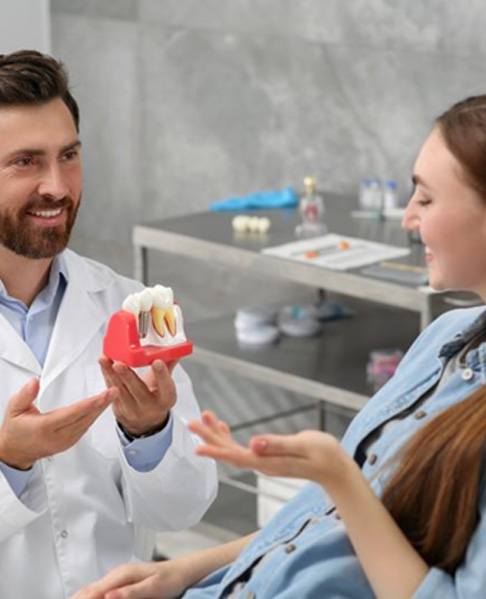Dental Implant Failure & Salvage – Dallas, TX
Get Your Restored Smile Back on Track

We often recommend dental implants as the best way to replace teeth. Not only are they strong and durable, but they also have an astonishingly high success rate. However, there is always a small chance that something could go wrong with them. If you ever believe that one or more of your implants are failing, contact our Dallas periodontal team. We will do all we can to perform dental implant salvage and get your restored smile back on track.
Why Do Dental Implants Fail?

The most common culprit behind dental implant failure is peri-implantitis, a form of gum disease that afflicts the tissue around an implant. Over time, it can cause so much damage that the implant loses its base of support. Often, missteps in oral hygiene are a big contributor to the development of peri-implantitis.
Other possible reasons for a failed dental implant include:
- Certain medical conditions, such as some types of cancer
- Traumatic injury, such as an accident
- Persistent pressure caused by frequent teeth grinding and clenching
- Failed osseointegration (failure of the tissues around an implant to form a bond with it)
Symptoms of a Failed Dental Implant

Dental implant failure can happen at any time, even many years after the initial placement surgery. Therefore, you should always be on the lookout for the following signs of dental implant failure:
- Unusual or severe pain. After you heal from your dental implant surgery, you should enjoy a pain-free smile. Unusual or severe pain is a reason to book an appointment with us right away.
- Difficulty chewing. Once you get used to your implants, it should be easy for you to eat virtually any food. Struggles in this area are a big red flag.
- An implant feels loose. A loose-feeling implant could be a problem with your restoration (crown, bridge, or denture). However, it could also indicate a problem with the implant itself.
- Signs of infection. Pus, swelling, redness, and gum recession could all point to peri-implantitis.
How Dental Implant Salvage Works

If you ever start to suspect that something is off with your dental implants, book an appointment with our team as soon as possible. The longer you wait to receive care, the less likely it is that the problem can be addressed via conservative means.
During your appointment, we will carefully examine your mouth to determine the nature of the problem. Then, we will design a treatment plan. You might need something relatively simple, such as a course of antibiotics or some improvements to your oral hygiene routine. However, there is also the possibility that you will require surgical intervention. We may need to remove the failing implant altogether. Later, after a recovery period, you may be eligible for a new one.
